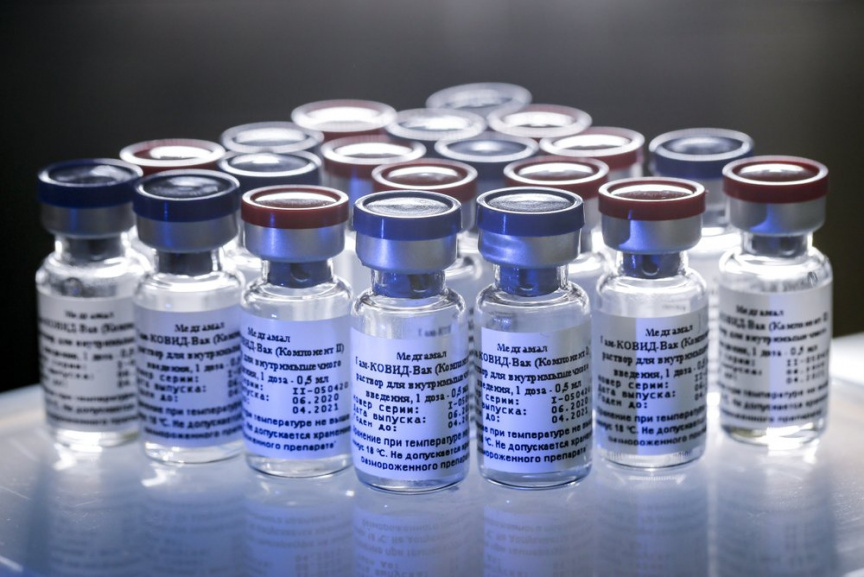
In this handout photo taken on Thursday, Aug. 6, 2020, and provided by Russian Direct Investment Fund, a new vaccine is on display at the Nikolai Gamaleya National Center of Epidemiology and Microbiology in Moscow, Russia. Russian President Vladimir Putin's announcement that his country is the first to approve a coronavirus vaccine hasn't provoked the awe and wonder of the Soviet Union’s launch of the first satellite into orbit in 1957. Instead the announcement was met by doubts about the science and safety of the vaccine. (Alexander Zemlianichenko Jr/ Russian Direct Investment Fund via AP)
MOSCOW (AP) — The mayor of Moscow invited residents Wednesday to join trials of a coronavirus vaccine that Russia approved for use earlier this month, in what officials described as a breakthrough on par with the Soviet Union’s launch of the world’s first satellite in 1957.
The world’s first vaccine against the coronavirus to receive a government go-ahead has caused unease among international medical experts, who called Russia’s fast-tracked approval and failure to share any data supporting claims of the vaccine’s efficacy a major breach of scientific protocol.
Scientists around the world say any widely-used vaccine should first be tested in advanced trials involving tens of thousands of people to prove it is safe and effective before being licensed.
In his invitation to the Russian capital’s residents, Moscow Mayor Sergei Sobyanin appeared to announce those kind of broad studies would be launched soon. He said the “post-registration research” will last six months and involve 40,000 people.
Sobyanin encouraged Moscow residents to sign up, arguing that the vaccine was based on longtime previous research and proven to be safe.
“We all were eager to see the creation of a vaccine, and now we have it,” Sobyanin said. “Now, Moscow residents have a unique chance to become the main participants in clinical research that will help defeat the coronavirus.”
The Russian Direct Investment Fund that bankrolled the vaccine said it will facilitate similar trials in five other countries, which it didn’t name.
“The post-registration clinical trial will allow for a permanent registration certificate and expansion of the circle of possible vaccine recipients, including the 60+ age group,” the fund said in a statement.
Scientists at the World Health Organization said last week that although they had begun discussions with Russia about its vaccine, they had not yet received any detailed data about it.
In announcing the vaccine’s approval on Aug. 11, Russian President Vladimir Putin said one of his two adult daughters already had been inoculated with it. He said the vaccine underwent the necessary tests and was shown to provide lasting immunity to the coronavirus, although Russian authorities have offered no proof to back up claims of safety or effectiveness.

Experts warn that using an untested vaccine that has not yet proven to be safe or effective could ultimately undermine the response to the pandemic and cause more distrust among people about whether or not to be vaccinated.
As of Wednesday, Russia had reported a total of over 970,000 confirmed virus cases and 16,683 deaths. Russian officials have said the vaccine would initially be made available to high-risk groups, including medical workers and teachers before it comes to broad use.
The vaccine developed by the Gamaleya Institute in Moscow with assistance from Russia’s Defense Ministry uses a different virus -- the common cold-causing adenovirus -- that’s been modified to carry genes for the “spike” protein that coats the coronavirus, as a way to prime the body to recognize if a real COVID-19 infection comes along.
That’s a similar technology as vaccines being developed by China’s CanSino Biologics and Britain’s Oxford University and AstraZeneca — but unlike those companies, Russian scientists haven’t published any scientific information about how the vaccine has performed in animal tests or in early-stage human studies.
Putin said one of his daughters has received two doses, and had minor side effects such as slight fever, and was “feeling well and has a high number of antibodies.”
However, many international experts remained skeptical as the experimental shots so far have been tested on just a few dozen people and there’s no published scientific evidence backing official claims of its efficiency.
The Russian Health Ministry said that the vaccine is expected to provide immunity from the coronavirus for up to two years, citing its experience with vaccines made with similar technology.
Becoming the first country in the world to approve a vaccine was a matter of national prestige for the Kremlin as it tries to assert the image of Russia as a global power. Putin repeatedly praised Russia’s effective response to the outbreak in televised addresses to the nation, while some of Moscow’s top officials – including the country’s prime minister and Putin’s own spokesperson – became infected.
Last month, the U.S., Britain and Canada accused Russia of using hackers to steal vaccine research from Western labs. Russia has denied involvement.
Several vaccines, including those developed by Oxford and the U.S. National Institutes of Health, are currently in advanced testing and hope to have results later this year.
___
Source: AP